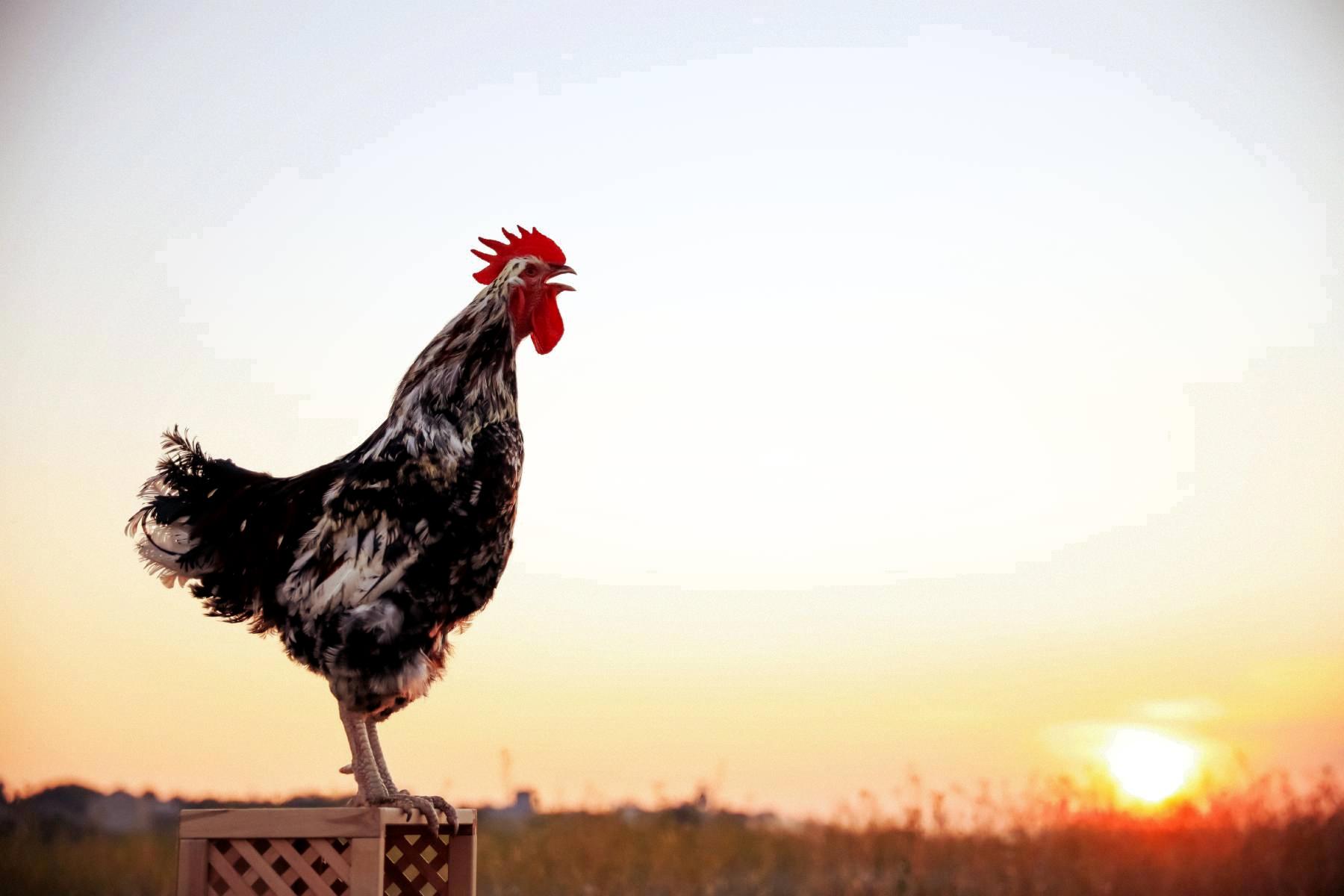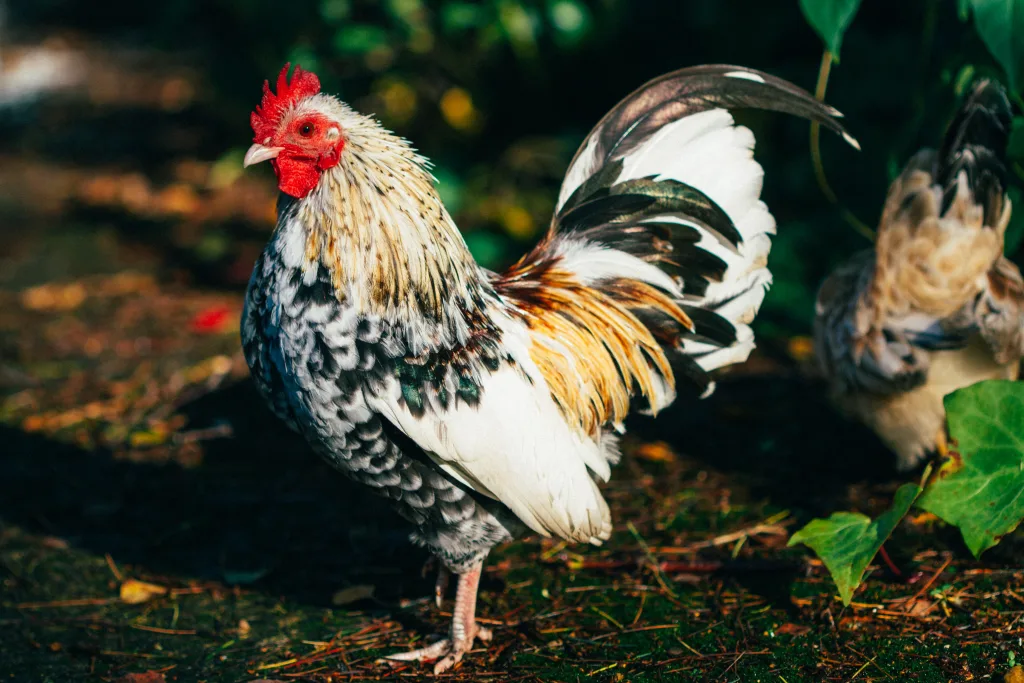Roosters, those iconic farmyard birds known for their distinctive crowing, have puzzled and fascinated humans for centuries. One question that often arises is why do roosters crow at night? To understand this behavior, we must delve into the fascinating world of rooster communication and biology.
Firstly, it’s important to note that roosters are diurnal creatures, meaning they are most active during the day. Their internal biological clock is typically synchronized with the rising and setting of the sun. This is why we commonly associate roosters with crowing at dawn, as they instinctively announce the start of a new day to their flock.
However, roosters can also crow at various times throughout the day and even during the night. One reason for their nighttime crowing is to protect their flock from potential nocturnal predators. Roosters have a keen sense of hearing and can detect even the slightest sounds in the dark. When they perceive a threat, such as the presence of a predator, they will emit a series of crowing calls to alert their hens and signal them to seek shelter.
Another reason for roosters crowing at night is territoriality. Roosters are highly territorial animals and often use their crowing as a means of asserting their dominance and proclaiming their territory. By crowing at night, they are essentially marking their presence and warning other roosters to stay away.
Additionally, hormonal factors can also play a role in a rooster’s nocturnal crowing. The levels of testosterone in a rooster’s body fluctuate throughout the day, peaking in the early morning. However, they can also experience surges in testosterone during the night, which can trigger crowing behavior.
It’s worth mentioning that not all roosters crow at night. Some may be more prone to crowing during the early hours of the morning, while others may be more active vocally during the afternoon or evening. Each rooster has its own unique personality and behavior patterns.
So, why do roosters crow at night? It’s a combination of their natural instinct to protect their flock from predators, assert their dominance and territoriality, and hormonal fluctuations. While the sound of a crowing rooster may be a familiar and sometimes disruptive sound, it serves important functions in the rooster’s world.
As we marvel at the complexity and diversity of the animal kingdom, it’s important to remember that each creature has its own unique behaviors and ways of communicating. The crowing of a rooster at night is just one fascinating aspect of their behavior that reminds us of the intricate web of life that exists all around us.
How Do You Stop A Rooster From Crowing At Night?
To stop a rooster from crowing at night, there are a few methods that can be effective:
1. No-Crow Collar: A no-crow collar is a device that fits around the rooster’s neck and restricts the airflow, making it difficult for the rooster to produce a loud crowing sound. This can be a humane option if used correctly and adjusted properly to allow the rooster to breathe and eat comfortably.
2. Confinement: Another option is to confine the rooster during the nighttime hours when crowing is most disruptive. This can be done by providing a separate and secure enclosure for the rooster, such as a coop or a soundproofed area. This will help minimize the noise disturbance during the night.
3. Minimize Flock Disturbance: Roosters often crow in response to disturbances or perceived threats. By keeping the flock calm and minimizing external disturbances, the rooster may be less inclined to crow excessively. This can be achieved by providing a quiet and stress-free environment for the flock, ensuring that they have enough space, food, and water, and avoiding sudden loud noises or disturbances.
4. Insulation and Sound Barriers: Adding insulation to the rooster’s coop or surrounding area can help muffle the sound of crowing. This can be done by using materials like foam panels or soundproofing blankets on the walls and roof. Additionally, creating sound barriers such as planting dense shrubs or installing fences can help absorb and block the noise.
It is important to note that crowing is a natural behavior for roosters, especially during the early morning hours. While these methods may help reduce the noise, it may not completely eliminate it. It is also essential to ensure that the rooster’s welfare and comfort are prioritized when implementing these measures.

Why Is A Rooster Crowing At 3 Am?
A rooster may crow at 3 am for various reasons. Here are some possible explanations:
1. Biological clock: Roosters have an internal clock that regulates their crowing behavior. They have a natural instinct to crow at specific times, including early morning. This behavior is influenced by the rising sun and the need to establish their presence within the flock.
2. Territory defense: Roosters are territorial animals and crowing is one way they mark their territory. By crowing at 3 am, the rooster is likely asserting his dominance and warning other roosters in the vicinity to stay away.
3. Hormonal changes: Roosters undergo hormonal changes that can affect their crowing patterns. These changes may be triggered by factors such as mating season, environmental conditions, or the presence of nearby hens. Increased crowing at 3 am could be a result of these hormonal fluctuations.
4. Disturbances or perceived threats: Roosters have a keen sense of hearing and can be easily disturbed by noises or perceived threats. If the rooster hears a loud noise, an unfamiliar sound, or senses a potential predator, he may crow to alert the flock and warn them of the potential danger.
5. Distressed or lonely: In some cases, a rooster may crow excessively at 3 am due to distress or loneliness. Roosters are social animals and prefer to be in the company of other chickens. If a rooster is separated from his flock or feels isolated, he may crow to seek companionship or express his discomfort.
It’s important to note that roosters crowing at 3 am can be disruptive to nearby residents. If this becomes a persistent issue, it may be necessary to take measures to minimize the noise, such as relocating the rooster to a more secluded area or using soundproofing techniques.
What Does It Mean When You Hear A Rooster Crow?
When you hear a rooster crow, it typically means that the rooster is communicating with its flock. Roosters crow to signal the start of the day and to lead their flock out to forage. This crowing can be heard as a way of saying good morning to the other chickens.
However, roosters can also crow for other reasons. One such reason is to warn their flock of potential danger. If a rooster senses a threat or perceives something as a danger to the flock, it may crow loudly to alert the other chickens and prompt them to take cover. This serves as a form of communication and helps ensure the safety of the flock.
Additionally, roosters may crow to establish and announce their territorial boundaries. By crowing, they are asserting their dominance and letting other roosters know that the area belongs to them. This helps to prevent conflicts and maintain order within the flock.
It is important to note that while roosters are often associated with crowing in the morning, not all roosters limit their crowing to this time of day. Some roosters may be noisier in the afternoon or at other times. The specific timing and frequency of crowing can vary among individual roosters.
When you hear a rooster crow, it generally means that the rooster is communicating with its flock. This can include greetings, warnings, or territorial announcements. Roosters may crow in the morning to start the day, but their crowing can occur at various times throughout the day depending on the specific circumstances.
Why Is My Rooster Crowing All Day And Night?
Roosters crowing all day and night can be attributed to various reasons. Here are some factors that may contribute to this behavior:
1. Territory Defense: Roosters crow to establish and defend their territory. They perceive any potential threat or intrusion as a challenge to their authority, prompting them to assert their dominance by crowing.
2. Hormonal Changes: Hormones play a significant role in roosters’ crowing behavior. They have a surge of testosterone in their system, which can make them more assertive and vocal. Hormonal changes can occur at any time, causing the rooster to crow frequently.
3. Communication with Hens: Roosters crow to communicate with their flock, particularly the hens. A rooster’s crowing can serve as a means of attracting and rallying the hens, indicating the availability of food, or signaling a potential danger.
4. Disturbances and Noise: Roosters are sensitive to disturbances and loud noises, which can trigger their crowing. When they hear unfamiliar sounds like a car starting up, a dog barking, or even a radio turning on, they may perceive it as a threat and respond by crowing.
5. Competition with Other Roosters: If you have multiple roosters in close proximity, their crowing can become a territorial competition. Each rooster may try to outdo the others by crowing louder and more frequently, especially if they feel their power or dominance is being challenged.
6. Genetic Predisposition: Some roosters may have a genetic predisposition to crow more frequently. Certain breeds are known to be more vocal than others, and individual roosters within a breed may have varying levels of vocalization.
7. Seasonal Changes: Roosters’ crowing behavior can also be influenced by seasonal changes. During breeding seasons or times of increased daylight, roosters may be more prone to crowing as they become more active and motivated to reproduce.
It is important to note that excessive crowing can be disruptive, especially if you live in close proximity to neighbors. If the noise becomes a problem, you can consider options like soundproofing the coop, providing distractions for the rooster, or even seeking advice from a local veterinarian or poultry expert.

Conclusion
Roosters crow throughout the day for various reasons. While their crowing is commonly associated with the morning dawn, it serves more purposes than just greeting the day. Roosters use their crowing to communicate with their flock, alerting them to potential threats and signaling territorial boundaries. They may also crow when they feel their power or territory is being threatened, such as when a human enters the coop or when they hear loud noises like a car starting or a dog barking.
Crowing is not solely a territorial or protective behavior, but also a way for roosters to communicate and maintain order within their flock. It serves as a warning signal for the hens to seek shelter from potential predators and helps keep the group safe.
While roosters crowing can be noisy and sometimes disruptive, there are methods available to minimize their crowing, such as using no-crow collars or confining them during sensitive periods. It is important to note that crowing is a natural behavior for roosters and is an integral part of their role as protectors and leaders of the flock.
Understanding the reasons behind roosters crowing can help us better appreciate and manage their behavior. Whether it’s a morning wake-up call or a warning signal, roosters play an important role in the dynamics of a chicken flock and should be respected for their innate instincts and abilities.
